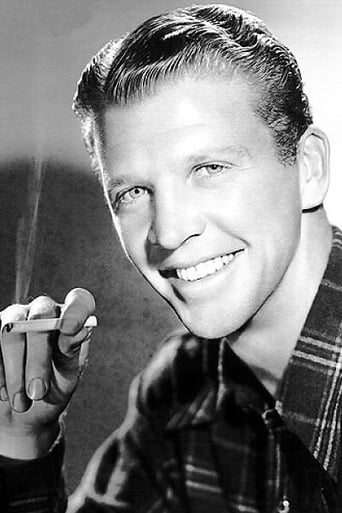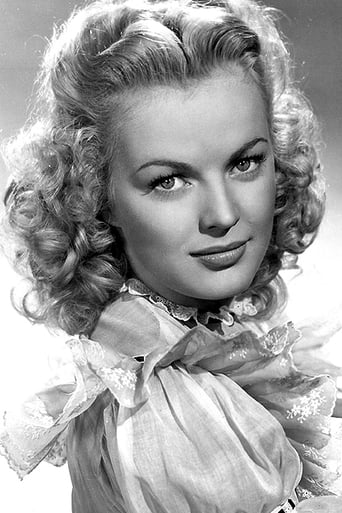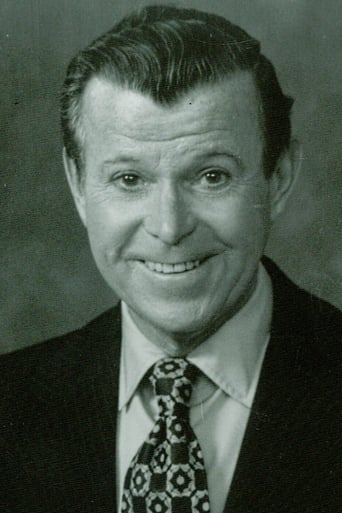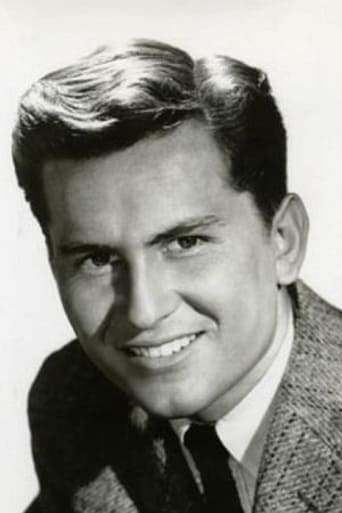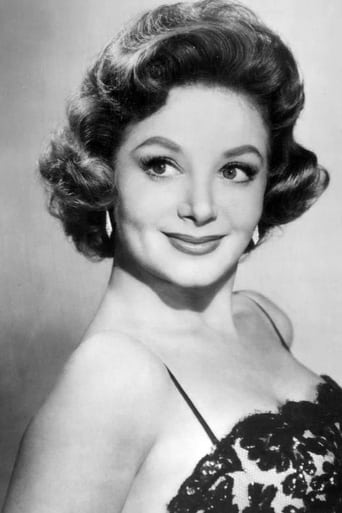VividSimon
Simply Perfect
SunnyHello
Nice effects though.
Humaira Grant
It’s not bad or unwatchable but despite the amplitude of the spectacle, the end result is underwhelming.
Loui Blair
It's a feast for the eyes. But what really makes this dramedy work is the acting.
weezeralfalfa
This fun contemporary musical marked the end of an era for Fox musicals. It was the last of 5 films in which versatile likable Dan Dailey starred as the leading man with one of Fox's two blond leading ladies of '40s and early '50s musicals: Betty Grable and June Haver. This was June's last Hollywood film, after a string of mostly Fox or Warner musicals since '44. It was also singer Dennis Day's last Hollywood film. Finally, it was the last Fox film scored by composer Josef Myrow and lyricist Mack Gordon, who began collaborating on a number of Fox musicals beginning in '46, after Gordon's previous primary collaborator, Harry Warren, left Fox for MGM.Actually, Fox wanted Betty Grable to once again star opposite her favorite leading man for musicals. But, she turned it down. Thus, June served the purpose for which she was originally signed: as a backup for Betty, in case she couldn't or wouldn't do a film. Happily, we see that Dan and June also had super chemistry, bringing a high intensity of energy to the film. This is perhaps best exhibited by their unique spectacular 'mating dance', which provides a fitting finale to their whirlwind romance. Actually, its clear to me that they made a more dynamic pair than Betty and DanUnlike most of June's and many of Betty's previous musicals, which had nostalgic themes of the gay '90s through '20s, this film was set in contemporary suburbia, which was mushrooming in the years following WWII. Thus, we have spacious modern houses close to each other, but with backyards were parties and cookouts are hosted. Unlike most of June's other Fox musicals, there is no other significant female musical star to share the musical spotlight with. Also, unlike most Fox musicals of the '40s, most of the dancing and singing is done off-stage. Aside from the opening chorus girl number, the major exception is the imaginative film-noire-like song and dance to "Nowhere Guy": very different in mood to the effervescent other musical numbers: something that looks like it belongs in an MGM Kelly or Astaire-dominated film. The dream dance, involving Dan, June, and Dan's son, as well as several animated cartoon portions, also look more like MGM features, than Fox. The chief choreographer was Richard Barstow, whose only other film credits as such were for "A Star is Born" and "the Greatest Show on Earth" : 2 quite prominent films for their times. The musical director was Lionel Newman: brother of the more famous Alfred Newman. Marilyn Monroe, whose star was rapidly rising at this time, requested Lionel to be the musical director in all her films.The central drama of the film revolves around Dan's son's(Joe) strong opposition to admitting a female into his cozy life as a father and son family vs. the obvious strong attraction between Dan's and June's characters(Bill and Jeannie).. Obviously, Joe is still at that age where girls around his age are often considered boring and clumsy at things he's interested in(like fishing trips in the woods). He emphatically lets his wannabe girlfriend(Kitty) and stepmother (Jeannie) know about his profound disinterest in them. At first, Jeannie thinks she can bring Joe around to accepting her, then decides this isn't likely, and berates Bill for trying to badger Joe into changing his attitude toward her. She decides it's better if she moves away, until Joe belatedly offers some words of peace, causing her to delay her hasty plan, bolstered by the advice of her friends Reed(Dennis Day) and Rosie(Cara Williams). But, in the end, after the Bill-Jeannie crisis is resolved, when Kitty asks Joe if he will marry her when they grow up, she gets an emphatic arrogant "no", showing that Joe's dislike of girls(at least Kitty) has not budged.For the most part, laconic Bill provided a calming effect on the hyperkinetic social butterfly nightclub entertainer Jeannie, which is probably one reason she immediately fell for him, along with his obvious song and dance talent and domestic skills. Joe and Kitty provide characters that children can somewhat identify with. However, their dialogue with each other is often very awkward. ..The dish juggling act between Bill and Joe, accompanied by the song "I'd Rather Have a Pal Than a Gal", is a very clever scene, emphasizing their great relationship, and the lack of need for a woman to do household chores. However, after Joe goes to bed, Bill says, at times, he would like to reverse the "gal" and "pal" in the song: providing an opening for Jeannie. Bill's profession as a cartoonist provides a largely at-home job for a single father, and also leads into the several animated cartoon segments, which presumably mainly appeal to the children in the audience.Many viewers today are put off by Dennis Day's rather formal, if usually cheery, persona and formal attire, and his traditional Irish tenor singing, as contrasted with Dan's Gene Kelly style. I don't have a problem with him, certainly compared to Jeannie's comically super stiff and arrogant butler! Cara Williams, as his bright-eyed carrot-haired girlfriend, provides some distraction from June's dominance.
ryancm
GIRL NEXT DOOR is not your typical Fox musical. It's well done for what it is, but a little strange in that it includes a couple of animated scenes. Also a "dream ballet" ala OKLAHOMA!. The songs are unmemerable and the nightclub number in which June Haver and later Dan Dailey take part is like...unreal. How could all that scenery and visuals take place on a nightclub stage. Oh, I forgot..This is a musical. More like a musical fantasy in many ways. The one standout number has no dancing. Dan Dailey and Billy Gray as father and son sing a ditty while doing the dishes. They juggle and handle the dishware and silverware very cleverly. Don't know how many takes it took to do it, but it's a highlight of the movie and that bit alone is worth watching the film. Watch for the underused and underrated Cara Williams. A delight. Dennis Day, less so! Too bad this was Havers last film, as she had talent, although why her voice was dubbed after doing many earlier musicals is a mystery.
Andrew Schoneberg
This obscure film was a treat for me, a classic film buff; it's a rare musical from Hollywood's golden age that's I've never seen nor even heard of. The Girl Next Door is not only very well made and entertaining, but in 1951 this was cutting edge both in story and in the way it's musical numbers are staged.Plotwise, it's a mild domestic drama, coupled with a conventional romance. Innovative is that the story portrays a warm, friendship-based father-son relationship which functions very well without a mother or other woman being around. When the father falls for the professional singer-dancer woman next door, the son is resentful.The dance numbers are not only well staged and performed, but refreshingly creative. The standout is a film-noirish number, shot with highly stylized camera angles, stark lighting, highly effective use of contrasting colors, and slinky jazz dance moves. The capper is that the number is supposed to be a nightclub performance with Dan Daily in the audience; mid-number, he imagines himself into the number, first as a shadow and then as the primary male dancer (a la "The Purple Rose of Cairo", decades later). The film's opening is remarkable for it's time; credits are superimposed (very unusual for the time) on the first of a three song extended musical number which immediately set's up the story and gives us a lot of information about June Haver's character.Dan Daily is likable, charming, masculine, believable, as well as being a good enough dancer and singer. June Haver is sexy in a very wholesome way, has a great body, moves well, but is somewhat bland in the personality-acting department. Her singing is dubbed. The only weakness in the film are that Denis Day is barely mediocre as a comic second banana, though his singing is beautiful, if you like old fashioned Irish tenor vocalizing. Cara Williams is radiant and sassy in the typical role of wisecracking friend of the heroine, but she's given little screen time and the zingers she's given to say are bland. Otherwise the dialog is far above the norm for musicals of it's era.The DVD includes 3 documentary featurettes; 2 are very informative and well done, one is about the film and the other about Dan Daily. The third is about Billy Gray (Bud of "Father Knows Best"), it's hampered by not having any footage from non-Fox films he made, nor from the classic TV show.
marcslope
Such an obscure '50s Fox musical that I'd never even heard of it (and I know my '50s musicals), and made very late in the cycle of modest entertainments starring the likes of Dan Dailey and June Haver, this one has a few aces up its sleeve. There's a surprising amount of sung exposition at the beginning, under the credits, and later on some very brief singing sequences in the middle of dialogue -- it's as if even standard Fox musicals wanted to be more like their Rodgers and Hammerstein cousins on Broadway. It shows how pervasive the whole musical-comedy mode was back then. Later there are a couple of animated sequences that delve psychologically into the characters' motivations, and of course a dream ballet, and an amusingly overblown production number with Haver, "Nowhere Guy." The story's no great shakes, the songs run from OK to pretty good, and Haver proves again that proficiency at singing and dancing is less vital than personality, which she lacks. Dailey is a likable romantic counterpart, and Cara Williams is an invaluable best-friend-making-tart-comments -- though it's hard to accept that she'd fall for the rabbity face and syrupy tenor of Dennis Day. The utterly '50s production design is fun, and the more thorough musicalizing than usual gives this otherwise standard effort a couple of bonus points. All in all, it's very watchable.
